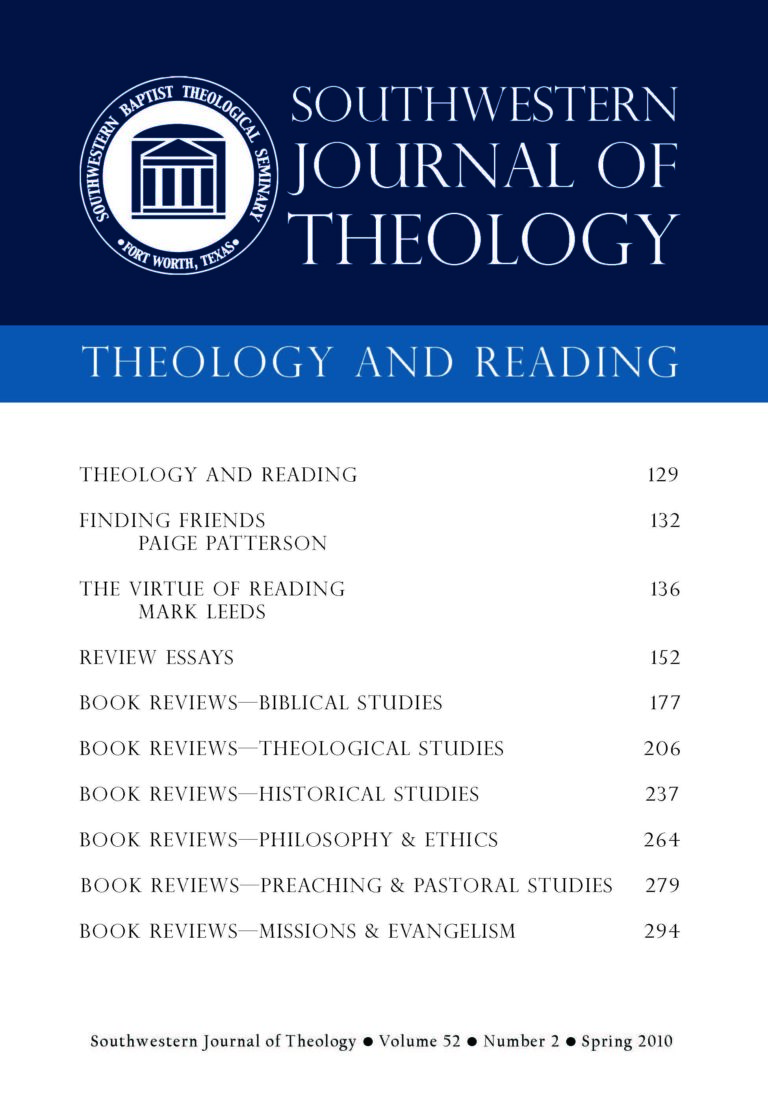
Theology and Reading
Southwestern Journal of Theology
Volume 52, No. 2 – Spring 2010
Managing Editor: Malcolm B. Yarnell III
By Nabeel T. Jabbour. Colorado Springs, CO: NavPress, 2008. 272 pages. Paperback, $ 14.99.
The main purpose of The Crescent through the Eyes of the Cross is to convey, especially to the western reader, how Muslims feel and what they think towards both the West and Christianity. In this book, Nabeel Jabbour tries to explain, out of his experiences with Muslims for more than five decades, how Muslims feel about Christians and the major reasons or motives of their reactions towards America and the West. Jabbour, in his attempt to describe Muslims’ points of view on many current topics, presents a fictional character of a Muslim intellectual man, called Ahmad, who was studying for a Ph.D. in the USA.
In the first part of the book, chapters 1 through 7, Ahmad explains three major reasons that hinder him from becoming a Christian: the Christian message, the Christian messenger or evangelist, and the Muslim as the receiver of the message. Ahmad claims that the Christian message does not make sense to most Muslims, links the Christian evangelists with the western culture then combines it with colonialism, and finally believes that leaving Islam, and becoming integrated into Christianity, would cause him to lose his identity. Furthermore, in this part of the book, Ahmad’s father and sister share about some of their grievances against Christians and the role America plays in the world and link this role to Christianity. They explain some of their perspectives concerning world events and Islamic beliefs. Jabbour then addresses the issues that the fictional Ahmad raised.
In the second part of the book, chapters 8 through 13, Jabbour explains how Muslims think and react by clarifying in-depth the different paradigm through which they look at the world. In the third part of the book, chapters 14 through 17, Jabbour discusses practical ways to connect with Muslims. He emphasizes the importance of ministering to Muslims within their context and assuring that a Muslim can believe wholeheartedly in Christ while remaining among his people as salt and light.
There are four major strengths in this book. First, as an Arab Christian, Jabbour has significant experience with Muslims, especially in the Middle Eastern cultures, which provides him a unique understanding of Islam that is needed in the West. Jabbour provides beneficial insights and important tools for Christians to understand Islam and to know how to connect with Muslims (94–95). Second, inventing Ahmad as a Muslim character to dialog about Muslims is a creative turn. The reader of this book feels the sincerity and honesty, as well as the frustration and grievance, in Ahmad’s words and tone. Ahmad seems to be very real. Third, Jabbour explains the main four paradigms that exist worldwide: guilt/ righteousness, shame/honor, defilement/clean, and fear/power. Jabbour encourages Christians to understand how these paradigms work among different Islamic groups and societies (171–72). Finally, the examples Jabbour gives on relational evangelism are very helpful for Christians, especially in the West, to understand how to approach Muslims and connect with them, in practical ways, in their own context.
There is only one drawback in this book. Although Ahmad’s character wellrepresents the worldview of some Muslims, it does not in reality represent the vast majority of Muslims. Ahmad might represent a sample of some Quranic Muslims but not all, and definitely he does not represent cultural or militant Muslims. He is a very well-educated PhD student who is exposed to the Western culture; consequently, his worldview does not necessarily describe how the vast majority of Arabs believe. Ahmad indeed represents a rare case among Arab Muslims.
In such challenging and confusing days of trying to understand Islam, The Crescent through the Eyes of the Cross helps Christians, especially in the West, understand Muslims. Out of his unique background and experience, Jabbour encourages Christians to step into the shoes of Muslims and to get out of their Western comfort zone and to start taking initiatives in connecting with Muslims in their own context. Jabbour’s book provides great insights on Islamic beliefs, culture, and context. As many debates are being waged over Islam, and as the frustration against Muslims is raising day after day, Jabbour’s book would be a great help to comprehend Muslims and love them as Christ does. The careful reading, the diligent use, and the genuine application of this book could revolutionize and transform one’s experience in communicating the gospel to Muslims.





